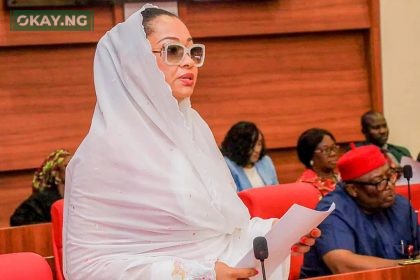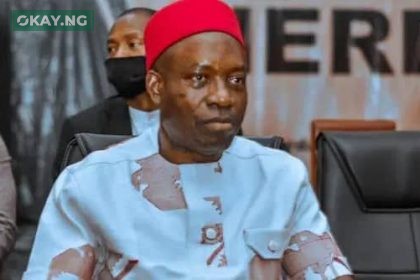Supreme Court Explains Rationale Behind Rivers, Abia, Akwa Ibom Rulings (READ)
Following the rulings of the Supreme Court on the governorship elections in Akwa Ibom, Abia, Ebonyi and Rivers states- heavy criticism emanated from various quarters as to why the apex court did not take the reports from Card Reader Machines into consideration before issuing judgments on the matters.
The Supreme Court had simply issued its judgments without giving reasons behind the decisions reached- with a promise to offer explanation to Nigerians on a subsequent day.
While justifying its rulings on Friday, February 5, the Supreme Court said although the use of the Electronic Card Reader Machine for accreditation of voters was provided for in the Approved Guidelines and Regulations for the conduct of the 2015 general elections- the device was however, never ‘intended to supplant, displace or supersede’ the Voters’ Register.
The apex court stated that the issue had resulted to various Divisions of the Court of Appeal, giving different interpretations on election disputes that were brought before them by appellants.
A seven-man panel of Justices of the apex court, led by the Chief Justice of Nigeria, Justice Mahmud Mohammed, made the position of the court on the matter known.
“True, indeed, the Card Reader Machine traces its paternity to the above Guidelines and Regulations. Regrettably, its probative pedestal in the vocabulary of electoral jurisprudence has generated conflicting interpretations from Their Lordships of the different Divisions of the Court of Appeal.”
“With the intervention of this court, in its recent decision in Shinkafi v Yari (supra), it is hoped that practitioners and all other courts will begin to appreciate the position of the said Card Reader Machine, and the Reports generated therefrom, in election litigation.”
“Prior to the authorisation of its use by the Guidelines and Manual (supra), the Electoral Act, 2010 (as amended), in sections 49 (1) and (2), had ordained an analogue procedure for the accreditation process. As a corollary to the procedure outline above, section 53(2) of the said Act (that is, the Electoral Act) enshrined the consequences for the breach, negation or violation of the sanctity of the actual poll sequel to the consummation of the accreditation procedure in section 49 (supra).”
“With the advantage of hindsight, INEC, pursuant to its powers under the said Electoral Act, authorised the deployment of the said Card Readers. Even with the introduction of the said device, that is the Card Reader Machine, the National Assembly, in its wisdom, did not deem it necessary to bowdlerise the said analogue procedure in section 49 from the Act so that the Card Reader procedure would be the sole determinant of a valid accreditation process.”
“Contrariwise, from the Corrigendum No 2, made on March 28, 2015, amending paragraph 13(b) of the Approved Guidelines, it stands to reason that the Card Reader was meant to supplement the Voter’ Register and was never designed or intended to supplant, displace or supersede it.”
“Indeed, since the Guidelines and Manual, which authorised the use and deployment of the electronic Card Reader Machine, were made in exercise of the powers conferred by the Electoral Act, the said Card Reader cannot, logically, depose or dethrone the Voters’ Register whose judicial roots are, firmly, embedded or entrenched in the selfsame Electoral Act from which it )the Voters’ Register). Directly, derives its sustenance and currency.”
“Thus, any attempt to invest it (the Card Reader Machine procedure) with such overreaching pre-eminence or superiority over the Voters’ Register is like converting an auxiliary procedure- into the dominant procedure- of proof, that is, proof of accreditation.”
“This is a logical impossibility. Indeed, only recently, this court in Shinkafi vs Yari, confirmed the position that the Card Reader Machine has not supplanted the statement of results in appropriate forms; hence, the appellant still had the obligation to prove petition relating to accreditation of voters and over-voting as enunciated in several decisions of this court”, Justice Nweze added.
“More so, using the Ebonyi state gubernatorial dispute as an instance, the apex court panel noted that the Head of Unit, ICT Data Management at INEC headquarters, who testified as the PW-8 before the tribunal, explained that the Card Reader performed two roles, namely, the verification of the Permanent Voters Card, PVC, and the authentication of fingerprint. It observed that the witness, who generated a Card Reader Machines Report for Ebonyi State Governorship Election, had admitted that it was not a complete report covering all the details of Polling Units in the state as some Polling Units were not uploaded and thus not included in the report.”
“The witness said the report she tendered before the tribunal represented data that were successfully uploaded before the chairman of INEC gave an instruction for the server to be shut down. According to the Supreme Court, “Her trenchant responses, clearly, demonstrate that the Card Reader Machine Reports were neither inviolable nor sacrosanct as a host of intervening mischievous human variables could impinge on their reliability.”
“Against the background of the testimonies of PW8, it is, actually, surprising, that learned counsel to the appellant chose not to utilise the Voter’ Register, to show the entire gamut of the voters, but rather built his case on what, in the unanswerable words of the lower court was an exhibit that was not accurate, sufficient and comprehensive enough to be relied upon in proof of the allegation of non-compliance with the Electoral Act, 2010, as amended.”
“That is to say that the appellant (as Petitioner) failed to weave his case on the Voters ‘Registers and a fortiori did not produce such registers because if he had produced them, their contents would have been unfavourable to the allegations he made in the petition and hence his decision to withhold them.
“Thus, the appellant laboured in vain in the spirited attempt he made before this court to have the findings of the lower court vacated. He was, indeed, attempting the impossible given the anaemic evidence he adduced. In my view, the lower court, rightly, affirmed the findings of the trial tribunal in this regard”. Besides, the apex court held that the appellant, Edward Nkwegu Okereke, who was the candidate of the Labour Party during the April 11, 2015, governorship election in Ebonyi state, could not lay credible evidence to support his case against governor Umahi of the Peoples Democratic Party.”











